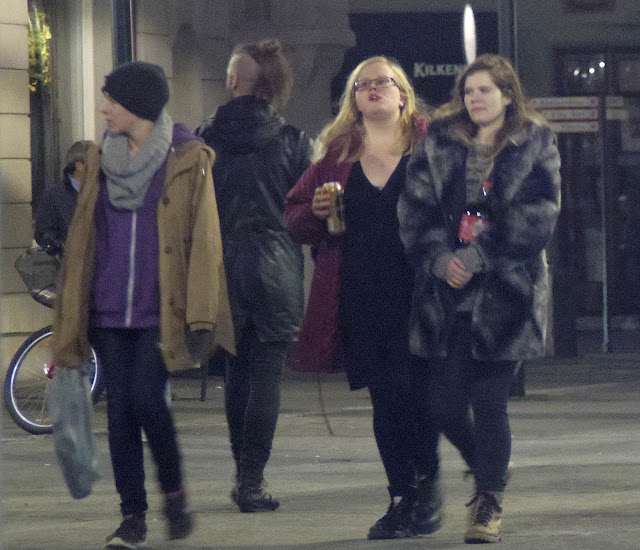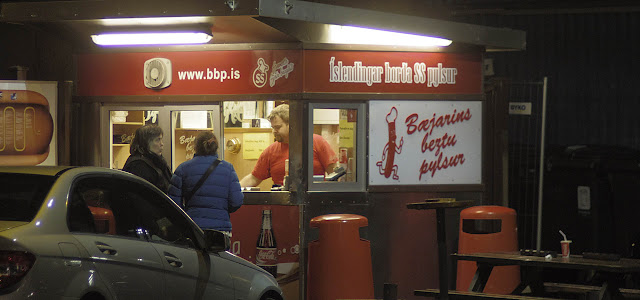Halloween
This is chapter 74 of The Matriarchy, a serial fiction novel on FITK

“Emily, do you know anything about some paintings of yours that Regelind had?” asked Sean, looking up from his laptop.
Sean, Emily, and Mary were having breakfast in Sean and Mary’s apartment.
“My paintings?” said Emily, “What do you want to know?”
“It’s part of the estate,” said Sean, as he turned the screen toward Emily, “The executors sent me some image files of them.”
“My paintings! They still exist!” Emily said, “John Regelind Senior bought them, back in the 20s. He told me he was going to stage an exhibition; I’d be the toast of New York, he'd get even richer. When the crash came the market for fine art collapsed, and that was that. I got pregnant, I went back to Iowa and had Tina. Later, when I went back to New York, he never spoke of them again. His money was good, though. I used most of it to save the farm. I did more paintings later—in the thirties—I don’t know what happened to them, they were in my apartment when I became ‘frozen’ in the Chamber Hose. Does it say how many there are?"
“The email said there are a dozen framed, and twenty-one unframed,” Sean said, “Perhaps you’ll have that exhibition yet.”
“That seems about right, the framed ones were for the show. The unframed ones must be the ones I did later,” Emily said, frowning, “Too bad I won’t live to see any show,” she said, “I met my guide last night.”
“What do you mean, your guide?” asked Sean.
“The Norn, the spirit being who will take me through to the other realm. When my time here on earth is over.”
“How did you meet, w… where…?” Sean stammered, “I don’t understand.”
Mary, who had been quiet throughout breakfast, spoke:
“That explains my dream last night. The woman in the hat. I thought she had come for me at first. But she turned away.”
“I met her through the spirit painting I was working on last night. The Haitian, John de Conqueroo, he had told me all about spirit guides. It won’t be long now.”
There was a prolonged silence. Finally, Sean spoke:
“Is there anything you’d like to do before you leave?”
“I’d just like to be where there are people and children,” Emily said, “People, for all their faults, are what human life is all about. And I want to hear the sound of children laughing.”
“There is a Halloween party tomorrow night, at Carkeek Park. There will be a lot of people—there is a playground—there should be kids,” said Mary, “We can dress up.”
“I’d like that,” Emily said, “I’d really like that.”
“I’ll see if any of the crew from ADR is up for it,” said Sean, “I can go as Rich Uncle Pennybags—you know, the guy from the Monopoly game.”
“Don’t let your new-found wealth go to your head,” said Mary, “With my current body I’m looking more and more like a pumpkin. Or maybe I’ll be a snow-woman. In whiteface.”
“I’ll go as what I really am… ” said Emily, “… a witch.”
The crowd at Carkeek was already sizable by the time Sean, Mary, and Emily arrived. There was a bonfire. In the west the sky still retained a streak of light even though the sun had set. Emily walked over to a bench next to the playground and sat down.
“Are you going to be OK here?” asked Mary, who had decided against an elaborate costume. She was in gypsy garb; with a flowing dress and a colorful scarf around her head. Sean had a top hat and a three-piece suit. “There’s a blanket in the car if you get cold.”
“I’ll be fine. You kids go for a walk. Just let me sit here a while by myself.”
The harvest moon shone brightly over the fields. Only an occasional cornstalk rose above the stubbled field.The shrieks of the children broke Emily’s reverie. They were in costume, chasing each other in the near-darkness. A sudden chill swept over Emily as she rose and went over to the bonfire. The flickering flames created silhouettes of those between her and the flame while the faces of those on the other side of the fire seemed to be aflame. Emily shivered; she walked up to where Sean and Mary were standing and put her body next to Mary’s.
“Emily, come on in, you’ll trip and fall, running around in the dark like that.”
“In a little while Ma, the moon is bright, I won’t fall.”
“You’re almost thirteen, you’re too old to be playing in the dark.”
“I’ll be careful, Ma.”
The barn cats ran along the fence, their eyes glowing as they looked back at Emily and the house behind her. Emily went out into the field, farther and farther, until the house lights were just a tiny spec. The smell of the soil had an essence of decay, but also contained a more subtle odor: a scent of new life, of life emerging out of death. Emily looked up at the moon. It was playing hide and seek behind the scudding clouds. In the distance, at the edge of the corn field, was the meadow, with the limbs of its naked trees stretching upward as if they were entreating the moon to descend and join them. Emily reached up to the moon, as if she were going to hold it to her breast and cuddle it like a baby. She felt a warm wetness in her crotch. She touched her leg and when she brought her fingers up to her face she smelled blood. Emily knew that she was no longer a child.
“Oh Mary, I’m so cold.”
“Sean, go get the blanket,” said Mary.
“No. Don’t go, stay with me.” said Emily, shaking.
Emily got a sudden whiff of freshly turned earth. She turned away from Mary and Sean and saw a woman standing beside her. The woman was wearing a hat with a turned down brim. Her face was in shadow. Emily nodded, and then turned back to Sean and Mary.
“I’ve never been any good at goodbyes… ” Emily began, “But this is my last one. It’s time.”
“Grandmother… ” said Sean.
“Oh, Emily… ” said Mary, choking back a sob, “What will I do without you?”
“Listen. My time here is over, but this is what you should do: Love each other. Love your child. Love life. Love humanity, as broken and torn as it is; heal it.”
The woman in the hat took Emily’s hand.
“Don’t try to follow me,” Emily said.
The two women left the bonfire and walked down to the bridge over the railroad tracks that lead to the ocean. It was quite dark now, the only things visible were the distant lights of the city and the faint reflection of those lights in the clouds above. Sean and Mary didn’t move. They watched Emily and the Norn walk over the bridge. From their viewpoint, it was impossible to see them once they began their descent to the shore.

Fiction











































